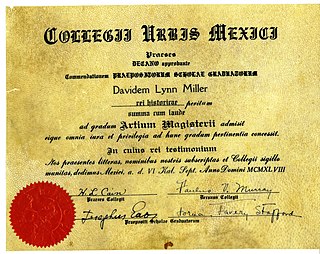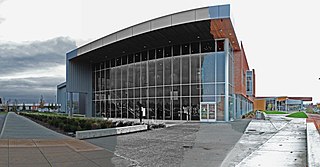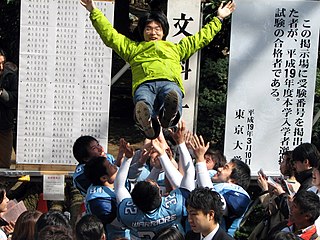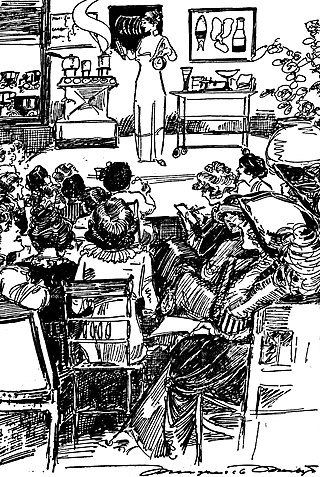
A community college is a type of undergraduate higher education institution, generally leading to an associate degree, certificate, or diploma. The term can have different meanings in different countries: many community colleges have an open enrollment policy for students who have graduated from high school, also known as senior secondary school or upper secondary school. The term usually refers to a higher educational institution that provides workforce education and college transfer academic programs. Some institutions maintain athletic teams and dormitories similar to their university counterparts.

Vocational education is education that prepares people for a skilled craft as an artisan, trade as a tradesperson, or work as a technician. Vocational education can also be seen as that type of education given to an individual to prepare that individual to be gainfully employed or self employed with requisite skill. Vocational education is known by a variety of names, depending on the country concerned, including career and technical education, or acronyms such as TVET and TAFE.

A diploma is a document awarded by an educational institution testifying the recipient has graduated by successfully completing their courses of studies. Historically, it has also referred to a charter or official document of diplomacy.

A vocational school, trade school, or technical school is a type of educational institution, which, depending on the country, may refer to either secondary or post-secondary education designed to provide vocational education or technical skills required to complete the tasks of a particular and specific job. In the case of secondary education, these schools differ from academic high schools which usually prepare students who aim to pursue tertiary education, rather than enter directly into the workforce. With regard to post-secondary education, vocational schools are traditionally distinguished from four-year colleges by their focus on job-specific training to students who are typically bound for one of the skilled trades, rather than providing academic training for students pursuing careers in a professional discipline. While many schools have largely adhered to this convention, the purely vocational focus of other trade schools began to shift in the 1990s "toward a broader preparation that develops the academic" as well as the technical skills of their students.

Clover Park Technical College (CPTC) is a public community college in Lakewood, Washington. There is also a smaller campus located at Thun Field in Puyallup, Washington, for aviation training.
Rochester Community and Technical College (RCTC) is a public community college in Rochester, Minnesota. It serves more than 8,000 students annually. The college was founded in 1915 on a motion by Charles Mayo to the Rochester School Board and is Minnesota's oldest original community college.

St. Lawrence College (SLC) is a College of Applied Arts and Technology with three campuses in Eastern Ontario, namely Brockville (1970), Cornwall (1968) and Kingston. It is affiliated with private Alpha College of Business & Technology in Toronto and Canadian College in Vancouver.

Green River College is a public community college in Auburn, Washington. It has a student body of approximately 10,000 and has satellite campuses in nearby cities of Kent and Enumclaw, Washington. The college primarily awards associates degrees but also offers 9 bachelor's degrees.

Higher education in Japan is provided at universities, junior colleges, colleges of technology and special training schools and community colleges. Of these four types of institutions, only universities and junior colleges are strictly considered postsecondary education providers. The modern Japanese higher education system has undergone numerous changes since the Meiji period and was largely modeled after Western countries such as Britain, France, Germany, and the United States of America combined with traditional Japanese pedagogical elements to create a unique Japanese model to serve its national needs. The Japanese higher education system differs from higher education in most other countries in many significant ways. Key differences include the method of acceptance, which relies almost entirely on one or two tests, as opposed to the usage of GPAs or percentages or other methods of assessment and evaluation of prospective applicants used in countries throughout the Western world. As students only have one chance to take this test each year, there is an enormous amount of pressure to perform well on it, as the majority of the time during a student's senior high school years is dedicated to performing well on this single test. Japanese high school students are faced with immense pressure to succeed academically from their parents, extended family members, teachers, guidance counselors, peers, and society at large. This mindset is largely based on a result of a traditional society that has historically placed an enormous amount of importance on the encouragement of study on top of the merits of scholarship and benefits of pursuing higher education, especially in an education system that places all of its weight upon a single examination that has significant life-long consequences on one's eventual socioeconomic status, promising marriage prospects, entrance into a prestigiously elite white-collar occupation, and a respectable professional career path. Unlike higher education in some other countries, public universities in Japan are generally regarded as more prestigious than private universities, especially the National Seven Universities.
The Seattle Vocational Institute is a constituent institution of Seattle Central College, a public community college in Seattle, Washington. It was founded as the Washington Institute of Applied Technology in 1987 and took its present name in 1991. It is located in the Central District.

The San Diego Community College District is one of the largest of California's 73 community college districts, the San Diego Community College District serves approximately 80,000 students annually at its three credit colleges, San Diego City College, Mesa College, and Miramar College, as well as seven campuses of San Diego College of Continuing Education.

Blackhawk Technical College is a technical school in Rock County, Wisconsin and a component of the Wisconsin Technical College System. The main campus lies between the cities of Beloit and Janesville; there are also several other locations.

The state of Connecticut funds and operates the Connecticut Technical Education and Career System (CTECS). It is a statewide system of 17 diploma-granting technical high schools and one technical education center, serving approximately 10,200 full-time high school students with comprehensive education and training in 38 occupational areas. CTECS also serves approximately 5,500 part-time adult students in apprenticeship and other programs. Two full-time adult programs are offered in aviation maintenance.

Highbury College is a further education college in Portsmouth, Hampshire, England. It offers vocational and academic education and training, including apprenticeships, A-levels and foundation degrees.

Vocational education in the United States varies from state to state. Vocational schools or tech schools are post-secondary schools that teach the skills necessary to help students acquire jobs in specific industries. The majority of postsecondary career education is provided by proprietary (privately-owned) career institutions. About 30 percent of all credentials in teaching are provided by two-year community colleges, which also offer courses transferable to four-year universities. Other programs are offered through military teaching or government-operated adult education centers.

In Canadian English, the term college usually refers to a career college, technical, trades, community college, college of applied arts or applied technology, or an applied science school. These are post-secondary institutions granting apprenticeships, citations, certificates, diplomas, and associate's degrees.
Technical and vocational education and training (TVET) in Mauritius provides technical and practical training for employment to students. Pre-vocational education in Mauritius provides preparation for technical and vocational education and training. Vocational education streams provide options for study and career development for school leavers as well as professionals.
Apprenticeship programs in the United States are regulated by the Smith–Hughes Act (1917), The National Industrial Recovery Act (1933), and National Apprenticeship Act, also known as the "Fitzgerald Act."













